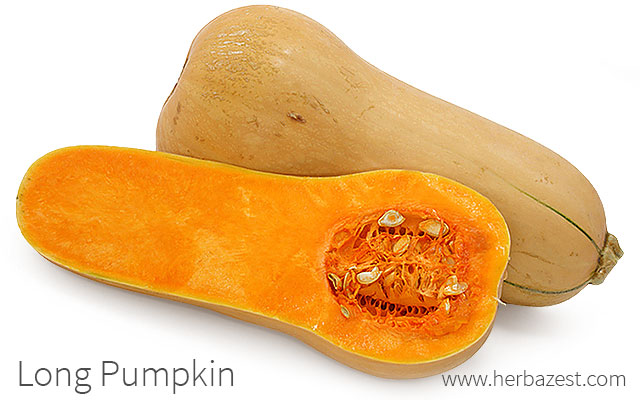The long pumpkin is a variety of Cucurbita pepo typically referred to as oblong winter squash, which is harvested during the fall season once fruits have reached full maturity. Long pumpkins are deliciously nutritious fruits that are commonly cultivated for culinary purposes, not necessarily for decoration and crafts.
Pumpkins Come in All Shapes
Beginning in the second half of the 20th century, new long pumpkin hybrids and cultivars were introduced as a way to enhance the quality of the existing plant crops, which were susceptible to disease.
Like their more traditional counterparts, long pumpkins will vary in their size, color, texture, and general appearance. However, unlike common jack-o'-lantern types, they have distinct oblong or cylindrical shapes.
Characteristics of Long Pumpkins
Long pumpkins, like many other cucurbits, produce flat, white seeds. Prior to cooking, their insides may appear significantly more rigid, and may have a larger seed to flesh ratio than the typical pumpkin. The spaghetti squash and delicata squash are two of the most common examples of long pumpkins.
Shaped like wide, giant, cylindrical beans, spaghetti squashes are yellow or tan in color with smooth, rigid skin. It is common to find spaghetti squash of up to one foot (30 cm) long and four inches (10 cm) in diameter. Additionally, spaghetti squashes may weigh up to seven or eight pounds (3 - 4 kg).
Delicata squashes usually weigh one to two pounds (450 - 900 g) and tend to be soft yellow or light green pumpkins, with mottled, dark green stripes that run lengthwise along the fruit. They may be fairly symmetrical or oddly-shaped cylinders with semi-bumpy skin.
Differences between Long Pumpkin Varieties
Rich in potassium, fiber, and vitamin A, long pumpkins are highly nutritious and used for a number of culinary purposes.
Delicatas, or long green pumpkins, have a sweet and creamy yellow flesh, often compared to that of a sweet potato. This particular type of long pumpkin has skin that is thin and edible. However, this may also make it more susceptible to superficial bruises.
On the other hand, spaghetti squashes, as their name suggests, have a neutral taste that can be enhanced with a variety of different sauces and seasonings. Spaghetti squash plants are also a bit more robust than other varieties of long pumpkins, successfully enduring adverse growing conditions and pests.
Where to Find Long Pumpkins
Harvested in the fall, long pumpkins can be found locally in a number of farmers' markets and in the fresh produce section of many supermarkets while they are in season. Prices for long squashes range from one to seven dollars, depending on the size.
Long pumpkins can also be grown wherever there are summers lasting more than a few short weeks. Seeds can be purchased from local seed merchants or from the garden center of many home improvement stores for under three dollars a pack.
What to Do with Long Pumpkins
While there are many ways to prepare long pumpkins, roasting, steaming, and microwaving are among the most popular. In most cases, it is advisable to remove the seeds prior to cooking.
Once cooked, the flesh of a spaghetti squash can be scraped out with a fork to produce long, noodle-like strips, while delicata squashes are excellent when roasted and often described as having a bit of a woodsier sweet potato taste.
How to Grow Long Pumpkins in Your Garden
The process of growing long pumpkins is similar to that of normal pumpkins: sow the seeds in warm weather after the threat of frost has passed. Plants should be harvested when the fruits have reached a deep, even color and the rinds have become durable.
With hundreds of hybrid long pumpkin varieties in existence, these unique cucurbits are cultivated specifically for human consumption. Stuffed with important vitamins and nutrients, long pumpkins make an excellent addition to any diet.
Sources
- Agricultural Marketing Research Centre, Squash
- Cornell University, Cornell delicate squash, disease-resistant version of heirloom winter variety, named 2002 All-America Selection
- Missouri Botanical Garden, Gardening Help FAQs, Horticulture Questions and Answers
- Purdue University, Botany, Cucurbit Crops – Squash and Pumpkin | Acorn and Specialty winter squash variety evaluation
- University of Illinois, hortanswers, Pumpkin
- USDA Nutrient Database




